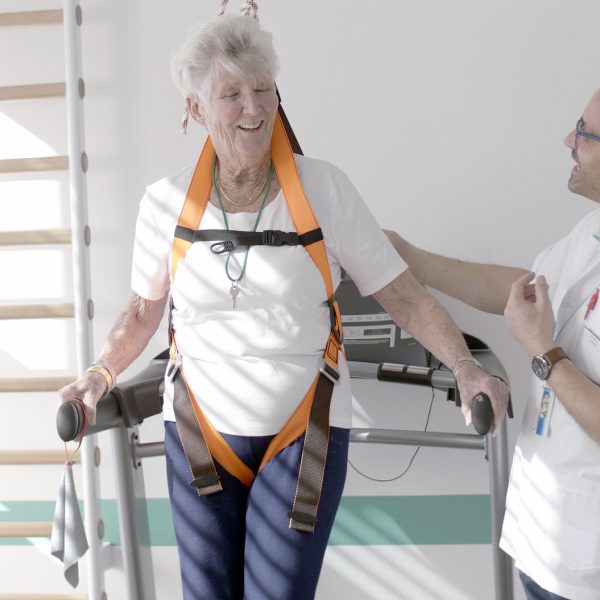The risk of falls is multi-factorial in origin, and increases exponentially from the age of 65 onwards. One of the major factors increasing the risk of falls is the reduction in muscle strength that occurs naturally with age.
According to the Swiss Accident Prevention Bureau (bfu), around
83,000 people aged 65 and over fall every year in Switzerland.
And every year, some 1,400 people lose their lives as a result of falls at home or during leisure activities, 96% of them are over 65. (Source: Health Promotion Switzerland)
Here are just some of the reasons why it’s important to maintain good muscle strength:
- Maintaining balance: the stronger the muscles, the better they are able to maintain balance even in difficult situations, such as walking on uneven or slippery ground.
- Quick reaction: strong muscles enable a quicker reaction in the event of loss of balance or an imminent fall.
- Improved posture: strong muscles help maintain correct posture, reducing muscle tension and joint pain. Good posture also enables the body’s weight to be distributed more evenly, helping to maintain balance.
- Increased confidence: older people with greater strength are more confident in their ability to get around and carry out everyday activities. This increased confidence can reduce the fear of falling, increase physical activity levels and thus reduce the risk of falling.
What are the nutritional tips for good muscle strengthening?
- Increase protein intake: Protein is needed to build and repair muscle. Older people need more protein to maintain muscle mass. Protein sources include meat, fish, eggs, dairy products, legumes and nuts.
- Eat foods rich in vitamin D: Vitamin D is important for muscle and bone health. It can be obtained from sun exposure, supplements or foods such as oily fish, mushrooms and dairy products.
- Eat calcium-rich foods: Calcium is important for bone and muscle health. Sources of calcium include dairy products, green vegetables, nuts and seeds.
- Eat foods rich in magnesium: Magnesium is important for muscle and nerve health. Sources of magnesium include green vegetables, nuts, seeds and wholegrain cereals.
- Eat foods rich in antioxidants: Antioxidants are important for muscle recovery after exercise and for reducing inflammation. Sources of antioxidants include colorful fruits and vegetables, nuts and legumes.
- Avoid processed and sugary foods: Processed and sugary foods can cause inflammation and muscle damage. It’s best to eat whole, unprocessed foods.
A healthy, balanced diet combined with regular exercise is essential for maintaining muscle strength.
In addition to strength, it’s important to assess patients for certain other key factors in order to determine greater risk of falls:
- Medical history: chronic illnesses, neurological conditions or balance disorders can increase the risk of falling. It’s also important to know if the patient is taking any medications that may affect balance or coordination.
- Lifestyle habits: physical activity, diet, alcohol and drug consumption can all affect the risk of falling.
- Balance assessment: to determine whether the patient is able to maintain balance in different situations, such as walking on an uneven surface or turning quickly.
- Gait assessment: to determine whether the patient has a stable, balanced gait.
- Vision assessment: adequate vision helps avoid obstacles and hazards.
- Environmental assessment: to determine whether the patient’s home or environment is safe and adapted to his or her needs and limitations.
In summary
- A comprehensive assessment of the patient’s health and physical condition enables the implementation of appropriate preventive measures to reduce the risk of falls and improve patient safety.
- Muscular strength is a key factor in preventing falls in the elderly. It can be achieved through adapted exercises, such as weight training, Pilates, yoga or gentle gymnastics. It is important to consult a healthcare professional to determine the most appropriate exercises for each individual case.
- For good muscle strengthening, it’s important to increase protein, vitamin D, calcium and magnesium intake, as well as eating foods rich in antioxidants and avoiding processed and sugary foods.
